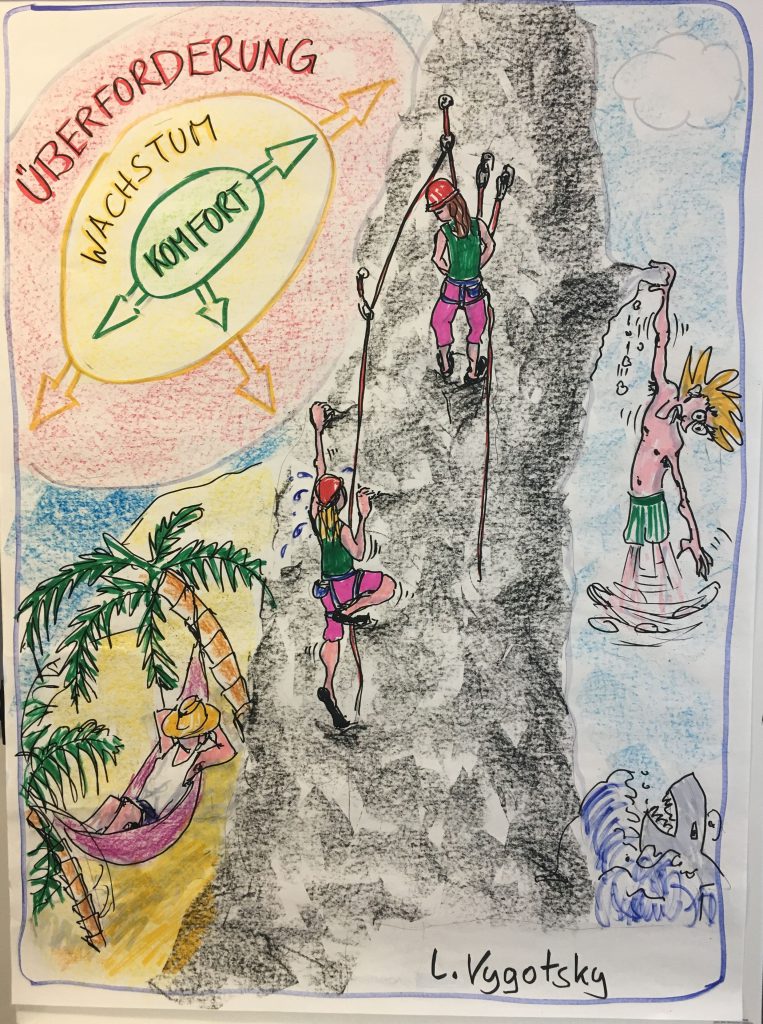What is going on and how we can influence it

- What actually happens during learning?
- What prerequisites do learners bring with them?
- How can we as trainers make learning possible?
These are the questions that #dimi_03 deals with.
If we understand the task as a trainer or speaker as facilitating learning, then it makes sense to know what happens during learning and how we as trainers can contribute to making it happen.
What actually happens during learning?
Learning is like breathing. It starts the moment we see the light of day and continues into old age. The saying: „You can’t teach an old dog new tricks,“ has proven to be a myth according to many studies in brain research. Our brain is much more capable of learning than is often assumed. Learning can be described in general terms as a process of acquisition. We deal with our environment on an ongoing basis, e.g. by performing a wide variety of tasks at work and in our free time. In order to be able to complete these tasks successfully, we constantly acquire skills and knowledge and learn day by day. You can read more about this in #thedi_01.
In most everyday situations, we are not consciously aware of learning. If we cannot solve a task or a problem, we usually try different ways out of instinct until we arrive at a successful solution. We can also observe this kind of learning in children. It is the most natural way of learning. We can also call it experiential learning. I will talk more about this in #dimi_11.
Learning takes place in informal and formal learning settings.

Everyday situations that are not specifically designated as learning situations are called informal. According to studies, about 75-80% of learning experiences across our lifespan occur in informal settings and only 20-25% in formal settings, such as training.
These figures show that we should by no means underestimate informally acquired knowledge and also make the best possible use of it in the formal learning setting. I will explain later what this means in more specific terms.
Learning requires irritation.
Whenever the existing knowledge or the welded-in experience is called into question, a window to learning opens. This insight from learning research can be helpful for us trainers.
It is about creating the right balance between building on existing knowledge and challenging learners to continue learning. Irritations activate the learners‘ brains and create a willingness to learn. This forms the basis for learning to take place at all. Holzkamp refers to the famous teaching-learning short circuit: „Where there is teaching, there is not automatically learning.“ Learning therefore always starts with the learners themselves and can only be set in motion to a limited extent by the trainers. The subject-scientific direction of learning research and transformative learning are concerned with this basic idea.
Adult learning = Connection learning.
The way adults learn differs significantly from children’s learning in one aspect. Adults have a wealth of experience – especially when it comes to learning in a professional context.

Their knowledge has taken on a certain structure and is mapped as a knowledge map in their brain. New knowledge, new impressions, new experiences are thus always compared with the existing wealth of experience. This can be perceived simultaneously as an opportunity and potential, but also as a danger.
Adult learners ask themselves questions like: Can this be true? Does this mean that the way I have done it up to now is wrong? Or: Aha, now I understand why I have reached this point. As a trainer it is important to consider these aspects.
What prerequisites do learners bring with them? What factors influence learning?
Learners have different prerequisites that positively influence or hinder learning. Experiences people have had with learning influence how well they can adapt to learning situations. You can find an interesting discussion on the topic of learning prerequisites here.
Learning is easy when it takes place in a pleasant and supportive atmosphere. Enthusiasm and positive emotions are like fertiliser for learning. Stress, on the other hand, prevents learning or leads to the fact that what has been learned cannot be stored. Here, however, one could say: „The dose makes the poison.“
A healthy amount of stress promotes a willingness to learn, but if the challenge tips over into panic, the window of receptivity sometimes closes very quickly.
Learning is a subjective process. Where the comfort zone merges into the learning zone and where the panic zone begins varies from participant to participant and also depends on the security that a learning setting brings with it.
The learning zone model describes this dynamic very vividly.
How can we as trainers facilitate learning in specific ways?
- Enable follow-up learning: The more we know about the prior knowledge and learning requirements of our participants, the better we can respond to them and adapt our didactic actions accordingly. On the one hand, this means giving space to experiences, e.g. by enabling them to be brought in and exchanged. On the other hand, it is also about keeping the question of practical relevance, usability and application constantly on the screen after the seminar.
- Create safe learning conditions: Learning is a social process. For us as trainers, this means that the group plays an essential role in ensuring that learning can succeed. Fruitful cooperation does not happen by itself. Creating this safe framework is an essential task for us as trainers. More on the topic of „social learning“ in #dimi_08.
- Less is more: When it comes to imparting knowledge, experts often get caught in the dilemma of trying to impart a lot of knowledge in a short time. Here it is important to courageously apply the scissors and focus on creating an overview of knowledge. Information overload leads to excessive demands and prevents learning. Only when learners have a clear map of their own knowledge are they ready for the in-depth exploration of content.
Want to learn more?
- Allespach, Martin; Meyer, Hilbert; Wentzel, Lothar (2017): Politische Erwachsenenbildung. Ein subjektwissenschaftlicher Zugang am Beispiel der Gewerkschaften. 2. Auflage. Marburg: Schüren.
- Grotlüschen, Anke (2004): Expansives Lernen: Chancen und Grenzen Subjektwissenschaftlicher Lerntheorie. Download the PDF here.
- Hackl Wilfried; Friesenbichler, Bianca (2011): Wie lernen Erwachsene? Neuere wissenschaftliche Erkenntnisse der Andragogik. Institut EDUCON. Download the PDF here.
- Hüther, Gerald (2016): Mit Freude lernen – ein Leben lang. Weshalb wir ein neues Verständnis vom Lernen brauchen. Sieben Thesen zu einem erweiterten Lernbegriff und eine Auswahl von Beiträgen zur Untermauerung. 1st ed. Gottingen: Vandenhoeck & Ruprecht.
- Zürcher, Reinhard (2007): Informelles Lernen und der Erwerb von Kompetenzen. Theoretische, didaktische und politische Aspekte. In: Materialien zur Erwachsenenbildung (2). Available online here.
All the books listed above and many more can be ordered at the ÖGB Fachbuchhandlung.
Author: Margret Steixner
Lust auf mehr? Zu allen Beiträgen der Serie kommst du HIER!

Dieses Werk ist lizenziert unter einer Creative Commons Namensnennung-NichtKommerziell-Weitergabe unter gleichen Bedingungen unter gleichen Bedingungen 3.0 Österreich Lizenz.
Volltext der Lizenz

Dieses Werk ist lizenziert unter einer Creative Commons Namensnennung-NichtKommerziell-Weitergabe unter gleichen Bedingungen unter gleichen Bedingungen 3.0 Österreich Lizenz.
Volltext der Lizenz


